Experts have said Nigeria and other African countries cannot reverse the trend of medical tourism without deliberate investment in knowledge production, research, and medical education.
They spoke at the Nigerian Medical Association (NMA) Healthcare and Medical Expo 2.0 in Abuja, themed, “Reversing Medical Tourism: Africans Investing in Africa.”
Speaking, the Chancellor of Ekiti State University, Dr Tunji Olowolafe, said this will strengthen local healthcare capacity.
Olowolafe emphasised that education-driven transformation is key to retaining talent and achieving healthcare self-sufficiency on the continent.
He said Africa must evolve from being a market for foreign medical services to a producer of innovative solutions through sustained collaboration among universities, professional associations, and private sector investors.
“Collaborations will help build pipelines of talent, research, and innovation, keeping our brightest minds intellectually and emotionally committed to Africa’s healthcare future,” Olowolafe stated.
He noted that while the brain drain has depleted Nigeria’s health workforce, it also validates the quality of Nigerian medical education, as locally trained doctors excel globally.
He therefore urged increased funding for faculty development, research, and modern training facilities to keep doctors competitive both globally and locally.
Olowolafe further called on donors and development partners to prioritise strengthening local systems rather than funding one-off charity missions. According to him, investing in the training of local surgeons would ensure self-sustaining medical excellence.
“Reversing medical tourism is not solely the task of government; it is a shared moral responsibility among practitioners, policymakers, investors, and civil society to safeguard Africa’s healthcare sovereignty,” he added.
In his remarks, Minister of State for Health and Social Welfare, Dr Iziaq Salako, described medical tourism as a severe economic and foreign exchange drain, disclosing that more than 30 per cent of Nigeria’s annual budget equivalent is lost to the trend.
Salako commended the NMA for driving national dialogue on local health investment, noting that the Tinubu administration is implementing strategies to strengthen domestic healthcare and attract inbound medical travel.
He identified oncology, orthopaedics, nephrology, and cardiology as the leading drivers of outbound medical tourism, revealing that about 40 per cent of Nigerians who travel abroad do so for cancer-related treatment.
The minister further announced the establishment of the National Tertiary Health Institution Standards Committee to assess and rank hospitals based on quality of care, helping citizens make informed choices and improving institutional accountability.
NMA President, Prof Bala Audu, said the annual expo represents a statement of purpose: Africa’s determination to reclaim ownership of its healthcare systems and innovations.
He revealed that the continent loses between $5 billion and $7 billion annually to medical tourism, a drain that weakens economies and public confidence in local medical institutions.
Audu noted that many Nigerians are unaware of the availability of high-end medical services within the country, even as Nigerian-trained doctors excel in top hospitals across the world.
“The knowledge and expertise our doctors take abroad were obtained here. What we need now is awareness, investment, and confidence in our own system,” he said.
According to him, the NMA established the expo to promote awareness, attract international patients, and position Nigeria as a hub for advanced yet affordable medical services in Africa.
“To achieve this vision, we must invest in health financing, enabling policies, and the environment that make Nigeria’s healthcare globally competitive,” Audu added.





